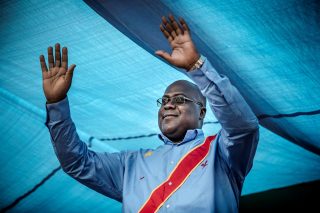Felix Tshisekedi on Thursday became the fifth president of the Democratic Republic of Congo (DRC) after he was sworn into office in a historic event at the Palais de la Nation in the capital Kinshasa. It was an event with a heavy diplomatic presence and thousands of Congolese citizens were present to cheerfully welcome their new leader.
The euphoria is understandable. This is the first time in the central African nation’s history that the Congolese would witness a peaceful transition of presidential power. It also signals the end of the 18-year ‘troublesome’ reign of Joseph Kabila.
However, amid the cheers and celebrations, there are lingering doubts about the credibility of the vote and the results which show that Tshisekedi’s journey to the presidency was not exactly smooth.
A relative newcomer to political sphere of DRC, Tshisekedi heads the Union for Democracy and Social Progress (UDPS), a position he took over after the death of his father, the veteran opposition politician and long-time Kabila rival, Étienne Tshisekedi. In what came as a shock to the international community, the 55-year-old politician was declared the winner of the December 30, 2018, presidential vote.
After the announcement of the final results, main opposition candidate Martin Fayulu contested the result in court and the Catholic Church in DRC (with its 40,000 election observers) said the real winner was another candidate. Fayulu claimed he won the election and that outgoing the president handpicked Tshisekedi in a ‘backroom’ deal.
More so, there was hesitation from Western powers over the credibility of the results and the South African Development Community (SADC) called for a vote recount and possibly a ‘unity’ government involving all parties to avert any likely post-election crisis.
However, after the proclamation by the country’s Constitutional Court approving Tshisekedi as the winner of the contested polls, the African and European Union signalled ‘partial’ support for the president-elect and other doubters have now moved on and are ready to work with the new leader.
Will President Tshisekedi have the independence to bring about desired reforms to one of Africa’s largest and wealthiest countries?
This will most likely be very difficult given that Kabila’s Joint Front for Congo (FCC) coalition claimed a majority (300 out of 500) of seats in the National Assembly despite its presidential candidate’s heavy defeat. Tshisekedi and Vital Kamerhe’s own coalition, Heading for Change (Cach), has only 46 deputies in the chamber.
According to a document obtained by AFP and reported by France24, two pro-Kabila and pro-Tshisekedi coalitions have signed a “political coalition” and “power-sharing” agreement. The document provides for a “distribution along political family lines of ministerial posts and other administrative posts.” Thus, cohabitation with a Kabila-designated prime minister may be inevitable.
The worries were perhaps most echoed by Fridolin Ambongo, leader of the Catholic Church, which plays an influential role in DRC politics. “I am very worried that the same system will continue with the new president,” the Archbishop said on Thursday.
The archbishop of the capital, Kinshasa expressed his fears that outgoing Kabila will continue to control affairs of state even after he officially exits the office. Also, there was a palpable worry that Tshisekedi who was declared president-elect may have little room to manoeuvre as Fayulu also claimed.
“There are indications, although hard to corroborate and prove. The allegations are not to be totally dismissed but then it is one thing to hatch a plan and another for the so-called plan to work,” said Jerry Bambi, a broadcast journalist based in DRC.
Bambi added that considering the international community has decided to move on after the much controversy and cooperate with the new leader, Congolese people, who have experienced several conflicts, can take respite in knowing there won’t be chaos over the election.
“The only message is that he does not forget where he comes from, he comes from the people, the people suffer,” Archbishop Ambongo added, stressing that the Catholic Church will continue to scrutinize the first steps of Tshisekedi who they hope would stick to his pledge to better the lives of ordinary Congolese. The Church has been behind political negotiations and protests calling for the government to hold polls.
In his inaugural address, Tshisekedi called for a “reconciled country.” He also vowed to enhance DRC’s respect for human rights, and build a Congo in which everyone has a place.
Millions of Congolese now look to him to implement his campaign promises of reducing poverty, providing free education and health, in addition to securing peace in the troubled eastern region of the country. But most importantly, it is hoped that he can handle the reins without any ‘interventions.’








